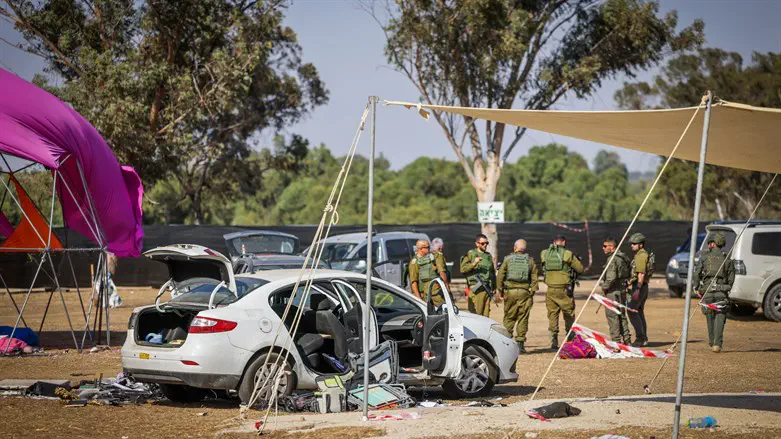
The IDF on Thursday published the findings of the comprehensive investigation into the security forces' conduct during the massacre at the Supernova Music Festival near Re'im on October 7th, 2023.
The deadly event, during which 378 civilians, members of the security forces, and staff members were murdered, and 44 were abducted (11 of whom were murdered in captivity), paints a picture of systematic failures in the IDF, especially in the Gaza Division and its Northern Brigade.
The inquiry praised the quick decision by Ofakim Police Station Commander Chief Superintendent Nivi Ohana to disperse the party when the missiles began to fly at 6:29 a.m. According to the findings, the decision saved the lives of thousands of partygoers and prevented an even bigger disaster.
A surprising point made in the inquiry was that Hamas did not plan to attack the festival. The terrorists, who were en-route to Netivot, made a wrong turn at the Shokeda Junction and unintentionally reached the Re'im campsite where the massive festival was being held.
Hamas's invasion plan was based on a missive barrage of approximately 5,000 rockets, which was meant to allow 1,200 terrorists to infiltrate Israel, seize bases and junctions in the Gaza envelope to isolate it, and after that, to massacre the residents of the communities. Most of the victims at Supernova were killed as they tried to flee the site and ran into terrorists in various locations.
On the morning of the massacre, there were 3,500 people, including staff members, police officers, and security guards, on the festival grounds. The main murder scenes were the festival grounds and the parking lots, the bend in the road near Mifalsim, the junction and entrance to Kibbutz Re'im, Gama Junction, the Be'eri area, the Alumim area, and Route 232.
The inquiry also looked into the process by which the festival was authorized and stated that the organizers acted properly in order to receive a permit. While IDF representatives were not present in police planning meetings, the military approved the first festival in principle, and a Home Front Command officer even toured the site ahead of the second festival. At first, the commander of the Northern Brigade did not approve the festival due to the need for soldiers and resources to protect it, but after a discussion with the Gaza Division, the permit was given due to the IDF's policy of not limiting daily life in the Gaza envelope.
The main criticism in the report was on the conduct of the Northern Brigade under the command of Col. Cohen and the Gaza Division. "There was no security coordination between the festival and the military activity in the area," the report states. It was also stated that a military representative was not sent to the police control room at the festival, the commanders did not inspect the area, and the military did not allocate forces to secure the event.
The report described the massacre, the systematic failures, and the acts of heroism by various individuals. Despite the festival being quickly dispersed by the police commander, terrorists reached key locations quickly and attacked the fleeing revelers. A report on behalf of the commander of the Home Front Command to the Northern Brigade's operations room at an early hour saying that most of the terrorists had left the site caused the military to lower its attention to what was happening there. The inquiry also points out an error in judgment by an attack helicopter pilot who did not strike a convoy of terrorists due to uncertain identification.
A Hamas Nukhba Force company, which numbered about 100 terrorists, arrived at the Supernova site at 8:10 a.m. after it got lost on the way to Netivot. The company, which was heavily armed, massacred 171 more Israelis who were at the scene, including wounded victims, staff members, and police officers. Only at around 11:30 a.m. did a small group of Givati soldiers and Israel Prison Service guards, who were directed by a soldier on leave, arrive and manage to eliminate 15 terrorists. The festival grounds were only completely cleared of terrorists at 3:00 a.m.
The inquiry found that the Northern Brigade and Gaza Division did not have an accurate idea of what was occurring at the festival and that the military was not in communication with the police and did not act to get information. The first report of the incident only reached the General Staff Operations Brigade at 10:00 a.m. The inquiry found a long list of failures in the Northern Brigade, Gaza Division, and Southern Command, which led to the severe tragedy not being prevented.
Among the main failures: Gaps in the military's preparations regarding the location of the festival and potential threats, the failure to conduct a situational assessment ahead of the massive event, the lack of awareness by most of the forces in the area of the festival and its details, severe gaps in the coordination between the military and civilian entities, failure to classify the festival as an essential asset, and the failure to set up a missile alert system.
